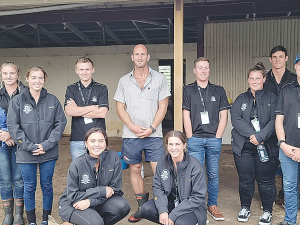Two new awards open to help young farmers progress to farm ownership
Entries have opened for two awards in the New Zealand Dairy Industry Awards (NZDIA) programme, aimed at helping young farmers progress to farm ownership.
 2021 National Dairy Trainee finalists after their final day of judging, before heading off on the study tour.
2021 National Dairy Trainee finalists after their final day of judging, before heading off on the study tour.
Changes have been announced to the New Zealand Dairy Industry Awards programme.
The Dairy Trainee category has undergone major changes - the age range is now 18 years to 30 years - with a maximum of three years' experience from the age of 18.
The online entry form has also been simplified.
Additional conditions for visa entrants have been removed with no minimum length of time in New Zealand required.
The modifications to the Dairy Trainee age range recognises that traditional pathways into the dairy industry have altered.
"According to Primary ITO, the average age of a dairy trainee is now 32 years and we are seeing many career changers joining the ranks," says NZDIA general manager Robin Congdon.
"These changes acknowledge the awards programme as a learning platform which recognises trainees' achievements, drives personal development, allows them to grow industry networks, and use the programe to develop skilles along the way."
NZDIA executive dairy trainee member Raewyn Hills says there was a strong desire to enhance the judging to be more educational, fun and engaging.
"We have revamped the process and the preliminary round will have a Skills Day with a practical focus, which will appeal to all," she says.
"We will also give on-the-spot feedback and training on how to complete the practical tasks on the day meaning entrants will come away having leant something rather than just judged."
The new format will also allow more trainees to go through the programme in less time, which means less pressure on volunteer regional teams and judges.
The preliminary round of practical judging will produce six Dairy Trainee finalists from each region, who will progress to a face-to-face interview round, which also include a large verbal practical element to assess general farming knowledge.
"This is invaluable experience for the trainees and develops their communication and interview skills," says Hills.
Regional winners will continue to the national programme, which includes a study tour, practical testing, and the National Awards dinner.
"There is a real buzz about the changes," she says. "We feel they will reinvigorate an already fun experience and our regional teams and judges are excited to get the 2022 programme underway."
The New Zealand Dairy Industry Awards are supported by national sponsors DeLaval, Ecolab, Federated Farmers, Fonterra, Honda, LIC, Meridian Energy and Ravensdown, along with industry partner DairyNZ.
Registrations of Interest for the 2022 awards can be made via: www.dairyindustryawards.co.nz with entries opening on October 1.
Budou are being picked now in Bridge Pā, the most intense and exciting time of the year for the Greencollar team – and the harvest of the finest eating grapes is weeks earlier than expected.
The Real Estate Institute of New Zealand (REINZ) has released its latest rural property report, providing a detailed view of New Zealand’s rural real estate market for the 12 months ending December 2025.
Rural retailer Farmlands has released it's latest round of half-year results, labeling it as evidence that its five-year strategy is delivering on financial performance and better value for members.
OPINION: "We are back to where we were a year ago," according to a leading banking analyst in the UK, referring to US president Donald Trump's latest imposition of a global 10% tariff on all exports into the US.
DairyNZ says the Government’s proposed Resource Management Act reform needs further work to ensure it delivers on its intent.
Overseas Trade Minister Todd McClay says he's working constructively with the Labour Party in the hope they will endorse the free trade agreement (FTA) with India when the agreement comes before Parliament for ratification.